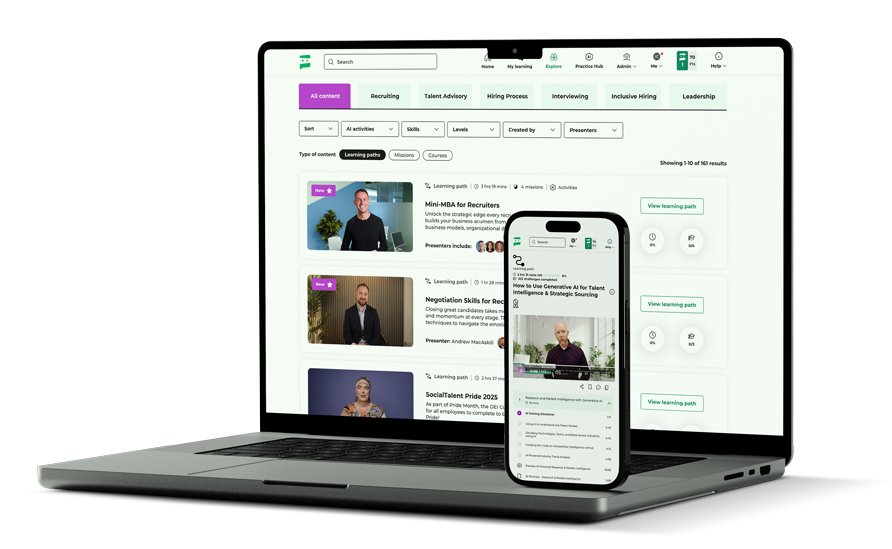
By Johnny Campbell
The Future of Work: Why AI Should Make Us More Human
In this episode of Hiring Excellence, Johnny Campbell speaks with Luciano Pollastri, Global Talent Director at Amadeus, a global leader in travel technology. Their conversation explores how AI can elevate – not replace – human capability. Luciano’s insights reveal how individuals and organizations can build an “operating model” with AI that supports learning, fairness, and meaningful connection.
1. From Skeptic to Superuser: Learning Through Curiosity
When ChatGPT launched publicly, Luciano admits he approached it with doubt. “I entered there with a unique intention to break it and show to the entire world that it was really bad,” he says. But what started as an experiment turned into a twelve-hour session that reshaped his thinking.
Curiosity led him to become an advanced user, creating over two thousand AI agents to support learning and productivity. His journey illustrates how curiosity and experimentation – not fear – are key to mastering new technology. For talent leaders, it’s a reminder that structured learning and iteration drive confidence and continuous improvement.
2. Overcoming the Fear Factor
Luciano believes most resistance to AI is emotional, not technical. “The fear of replacement,” he says, “is the first reaction people have when AI performs part of their job.” Others hesitate because they don’t understand how the technology works or worry about using it incorrectly.
His solution is simple: education. “If you start telling people that in reality generative AI is the most, almost the stupidest thing in the world – it’s a predictability model – then they start understanding how it works. They can be in control of AI instead of feeling that they’re being controlled by AI.”
Helping employees understand AI’s mechanics builds trust and confidence. The same principle applies in structured interviewing – when people understand the process, they feel empowered, not intimidated.
3. There Is No “Killer Prompt”: Context Is Everything
Luciano challenges the idea that great AI results come from copying someone else’s perfect prompt. “Each of us is the killer prompt,” he explains.
He teaches four elements that make AI truly effective: context, perspective, intention, and perception. Giving AI more information about your goals and environment helps it adapt to you – just as a well-prepared interviewer tailors questions to uncover the most relevant insights.
This approach highlights a larger theme: success with AI, like success in hiring, depends on preparation and clarity. The more intentional you are about what you want to achieve, the more value you’ll get from the tool.
4. The Danger of Delegation Without Understanding
Luciano draws a firm line between using AI as a helper and relying on it as a crutch. “I don’t delegate or use AI for anything that I don’t believe I can produce by myself,” he says. “The moment you delegate to AI what you haven’t mastered yourself, you waive your capacity to upskill in that area.”
He learned this lesson firsthand after creating a full competency framework with AI in just two hours – only for a colleague to tell him he’d taken away her chance to learn. It was a turning point. “I felt miserable as a manager… I made them feel that they were replaceable – and they are not.”
His reflection is a timely one: leaders must balance efficiency with development. In hiring, this means using technology to support judgment – not to replace it.
5. The Human Edge: Using AI to Deepen Connection
At Amadeus, AI supports Luciano’s work in recruitment by transcribing interviews and freeing him to focus on what matters most. “It allows me to only be focusing on the most human parts of the recruitment process,” he explains.
In one case, he noticed a candidate’s words conveyed confidence, but their delivery lacked inspiration – something the AI transcript couldn’t capture. “This part of perception,” he says, “I wouldn’t have been able to get if I was not focusing on that part.”
For Luciano, this is where AI shines: by taking care of the mechanics, it gives people more time to observe, listen, and connect.
Conclusion: Becoming Managers of Human and Artificial Resources
Luciano’s message for the future is clear: technology should make work more human, not less. “AI has helped me over the last year to have more human interactions… It opens up so many opportunities in the exchange, in the socialization, in the innovation” he says.
His vision? A new kind of leadership. “Each single person right now should be sitting and saying, ‘I’m going to become the manager of artificial resources and people resources.”
AI, when used responsibly, can amplify our creativity, empathy, and intelligence – helping us build better teams, better decisions, and a better world of work.
Want more conversations like this? Listen to the full Hiring Excellence episode with Luciano Pollastri, or explore more expert-led insights at SocialTalent.com!



